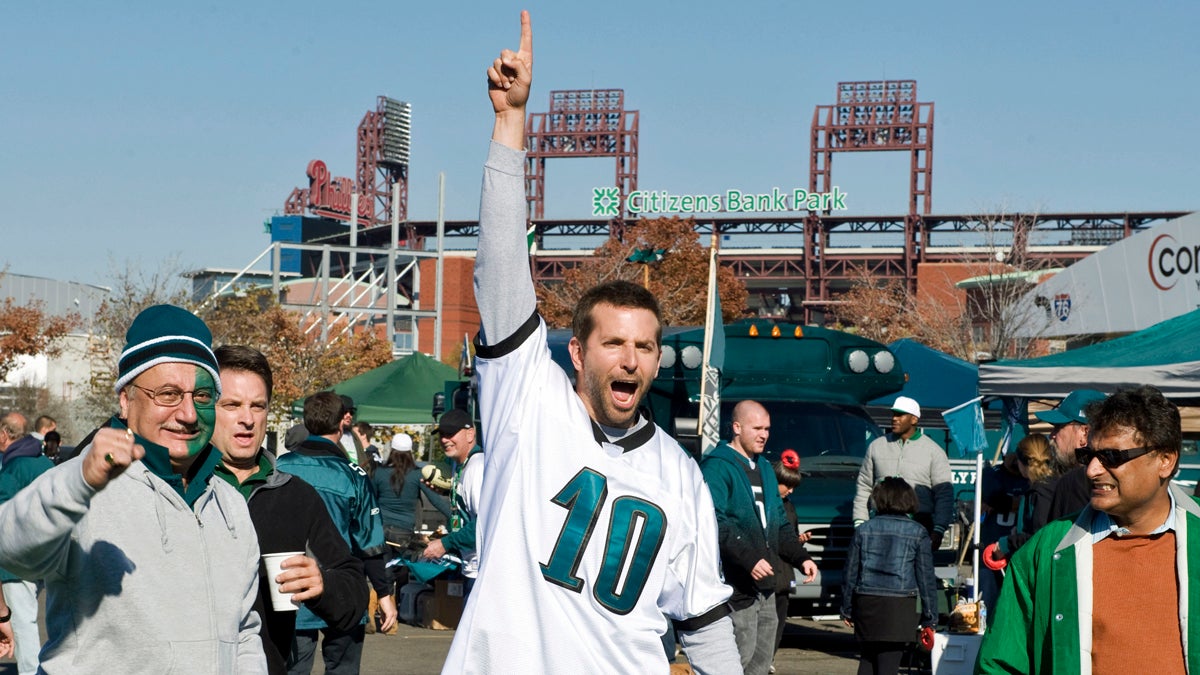This week on the web: Net neutrality, Google and Twitter reunited, and that Philly jawn
Listen
This undated film image shows Bradley Cooper playing Pat Solatano in a scene from the film, 'Silver Linings Playbook.' (AP Photo/The Weinstein Company, JoJo Whilden)
So what threatened to “break the Internet” this week?
NewsWorks Tonight host Dave Heller talks with Amy Z. Quinn, NewsWorks’ social media strategist, about the latest in net neutrality, a Google and Twitter reunion, and Phillyspeak — with an assist from Bradley Cooper.
In the war over net neutrality, the battle is officially joined.
The FCC this week announced it will impose new regulations on Internet service providers meant to ensure information travels at the same speed for everyone — that all traffic is created equal.
The Washington Post did a good job of breaking this issue down in plain English, and John Oliver had perhaps the definitive piece on his show:
The proposed regulations, supported by the Obama administration, would prohibit Internet providers from blocking services they don’t want to carry; throttling or slowing traffic to selected content providers or users; and creating tiers in which some would pay more.
But there is another side. Service providers argue that users who rely on moving massive amounts of data, like Netflix, should have to pay Internet service providers more to carry all of that data — think about it like an Internet impact fee. You need more bandwidth, you pay more.
The bottom-line question the FCC is trying to answer is should “the Internet” be treated like a public utility, like say gas or electric — or WOODER? More on that in a minute.
This week Twitter CEO Dick Costolo announced the company will partner with Google in what’s being called a “firehose deal,” making Google search a sort of firehose for Twitter content.
The idea is to get people other than Twitter’s 288 million active users to view tweets, including brand messages and advertisements. As Costolo said in an earnings report this week, it’s all about eyeballs.
Each year, an estimated 600 million people view tweets but aren’t “on Twitter” — they’re viewing public tweets. Perhaps you saw a tweet embedded in a news story and clicked on it, or someone sent you a link to that awesome Left Shark vs. Jabberjaw meme.
That’s good news for brands and for “content marketers,” who advertise through blogs, sponsored content, etc. Because, say I do a Google search for, say, the word “jawn,” not only will things like a Wikipedia entry and an Urban Dictionary entry come up, but tweets in which people talk about the jawn, or link to content about the jawn, will also show.
The two companies had partnered previously, from 2009-11, but that agreement expired and wasn’t renewed in part because at the time, Google was focusing on its own social products like Google Wave (Remember that? Probably not) and Google Plus.
Closer to home, Dave’s conversation earlier this week with linguist Meredith Tamminga has generated a lot of conversation — we like to talk about the way we talk!
Hundreds of commenters on our Facebook pages debated our unique vowel usage, our tendency to turn “street” into “shtreet,” our local lingo like jimmies and jawn and the Ack-a-me, and what it all says about us.
Even Bradley Cooper isn’t immune: In the attached sound clip, you’ll hear him catch himself lapsing into Phillyspeak during an interview with Terry Gross.
Some commenters raised the question of whether this is really just the accent of white, working-class Philly, and to some point that’s true — for sure there is a “black Philly” accent, but what we think of as Phillyspeak (or if you prefer, the dreaded hoagiemouth) is as much about socioeconomic status than anything else. It’s a blue-collar thing.
And like the New York accent, the Philly accent varies depending on what part of the city you’re in. Our friend Patsy from South Philly talks one way, but your cousin Marie from Roxborough sounds a bit different. And Maureen from the Far Northeast? That’s a whole ‘nother thing.
WHYY is your source for fact-based, in-depth journalism and information. As a nonprofit organization, we rely on financial support from readers like you. Please give today.


